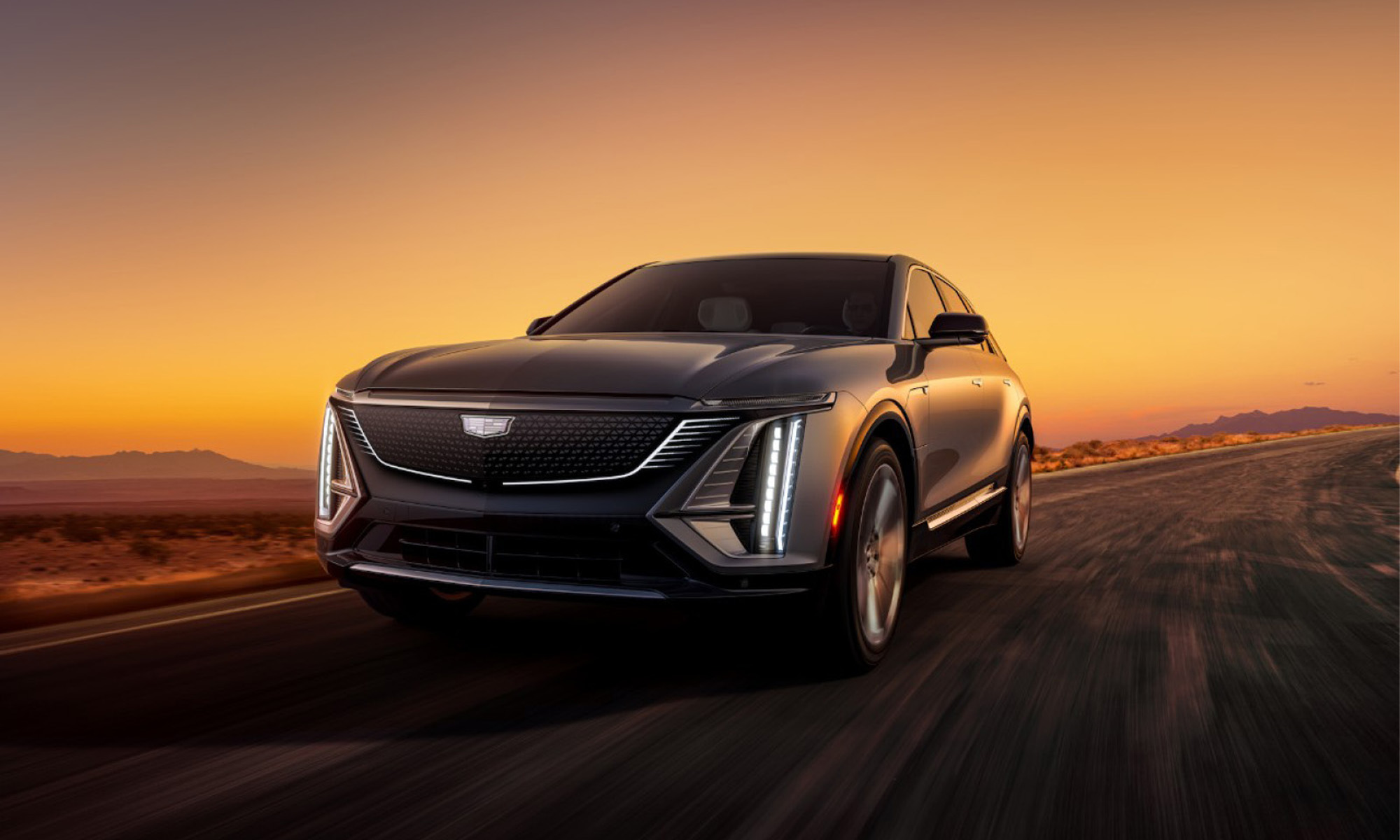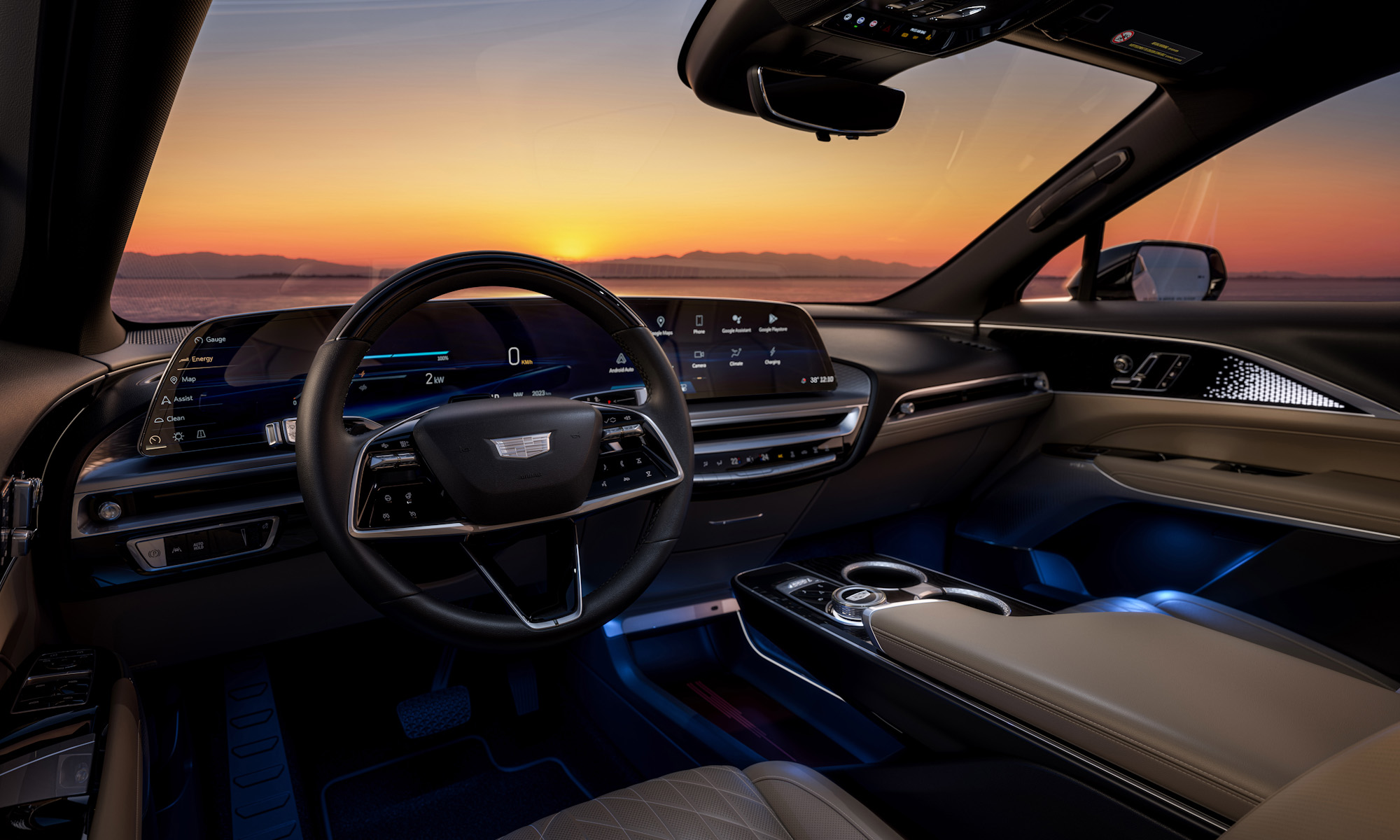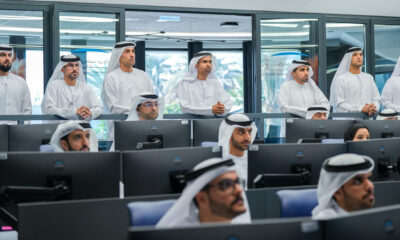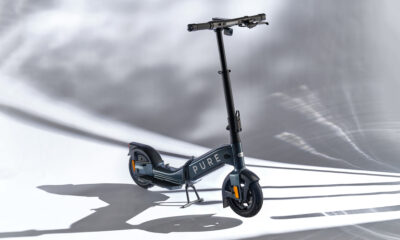News
Cadillac’s LYRIQ “Al Awael” Has Arrived In The UAE & Kuwait
The carmaker’s latest electric vehicle offers high levels of luxury and comfort, plus premium in-car entertainment and active road-noise cancellation.

Cadillac has brought its first-ever electric vehicle, the LYRIQ, to the UAE and Kuwait. The new model will roll out first as a special edition called Al Awael — meaning “the firsts” in Arabic.
The carmaker initially launched the LYRIQ in the USA and China before unveiling the EV in the Middle East. The limited edition version of this hotly-anticipated SUV comes in a Celestial Metallic armor color, with an Oxford Stone interior, exclusive badging, and a panoramic roof. Single-motor rear-wheel drive and dual-motor (500hp) all-wheel-drive versions are available, with the former achieving up to 494 km of range per charge from its 102-kilowatt-hour battery.

The Al Awael’s interior features laser-etched patterns on its wood-over-metal décor, plus a large, curved 33-inch diagonal LED screen. On-board tech includes built-in Android Auto and Apple CarPlay, while Active Noise Cancellation intelligently assesses wind and vibration and uses a premium AKG speaker system to cancel road-induced noise.
Also Read: WeRide Granted First Self-Driving Vehicle License In UAE
“Our journey to an all-electric future starts now with the epitome of sophistication, the exquisite LYRIQ. Powered by General Motors Ultium platform and curated with over 120 years of Cadillac’s design craftsmanship, it combines looks, performance, advanced technology, and exclusivity to provide an unparalleled driving experience,” announced Kristian Aquilina, Managing Director of Cadillac International Operations and Cadillac Middle East.
“With LYRIQ Al Awael, the first electric vehicle to reach our region, we invite loyalists, pioneers, and optimists to inaugurate the new era of luxury electric mobility and lead the way forward,” he added.
News
Alienware Just Announced Six New Gaming Monitors
The new models include three QD-OLED and three budget-friendly QHD options, expanding the company’s lineup for all gamers.

Alienware has just updated its gaming monitor lineup with six new additions, including the highly anticipated Alienware 27 4K QD-OLED Monitor. The latest wave of releases is set to reach more gamers than ever, offering high-end QD-OLED displays alongside more budget-friendly options.
The latest displays clearly show that the company is doubling down on QD-OLED with three new models sporting the technology. A redesigned Alienware 34 Ultra-Wide QD-OLED Monitor is also making a return, further refining what is already a fan-favorite display.
A Unified Design: The AW30 Aesthetic
All six monitors feature Alienware’s new AW30 design language, first introduced at CES. The AW30 aesthetic brings a futuristic, minimalist look that unites the entire lineup under a cohesive visual identity.
Pushing QD-OLED Even Further
The refreshed Alienware 34 Ultra-Wide QD-OLED Monitor (AW3425DW) builds on its predecessor’s success with a 240Hz refresh rate (up from 175Hz) and HDMI 2.1 FRL support. It also gains G-SYNC Compatible certification alongside AMD FreeSync Premium Pro and VESA AdaptiveSync, ensuring ultra-smooth performance. With a WQHD (3440×1440) resolution and an 1800R curve, this display enhances immersion for both gaming and cinematic experiences.
For those who crave speed, the Alienware 27 280Hz QD-OLED Monitor (AW2725D) pairs a high refresh rate with QHD resolution, balancing sharp visuals with ultra-smooth gameplay. Meanwhile, the Alienware 27 4K QD-OLED Monitor (AW2725Q) delivers stunning clarity with an industry-leading pixel density of 166 PPI, making it the sharpest OLED or QD-OLED monitor available.
Also Read: Infinite Reality Acquires Napster In $207 Million Deal
Worried about OLED burn-in? Alienware’s entire QD-OLED lineup comes with a three-year limited warranty covering burn-in concerns, offering peace of mind for gamers investing in these high-end displays.
Bringing QHD To A Wider Audience
Alongside QD-OLED, Alienware is also releasing three new QHD gaming monitors aimed at more price-conscious gamers. The Alienware 34 Gaming Monitor (AW3425DWM), Alienware 32 Gaming Monitor (AW3225DM), and Alienware 27 Gaming Monitor (AW2725DM) provide a range of sizes and formats to suit different preferences:
- The Alienware 34 Gaming Monitor (AW3425DWM): An ultrawide (WQHD) option for a panoramic, immersive experience.
- The Alienware 32 Gaming Monitor (AW3225DM): A standard 16:9 panel for a traditional but expansive desktop setup.
- The Alienware 27 Gaming Monitor (AW2725DM): A 27” display offering the same performance in a more compact form factor.
All three gaming monitors feature a fast 180 Hz refresh rate, a 1ms gray-to-gray response time, and support for NVIDIA G-SYNC, AMD FreeSync, and VESA AdaptiveSync to eliminate screen tearing. Additionally, with 95% DCI-P3 color coverage and VESA DisplayHDR400 certification, these displays deliver vibrant colors and high dynamic range for lifelike visuals.
























